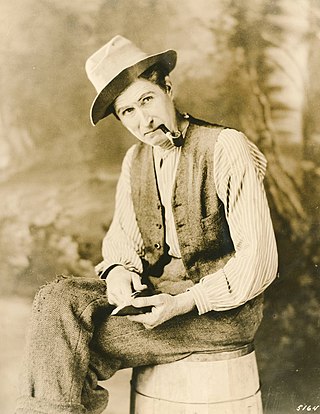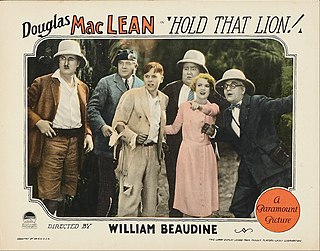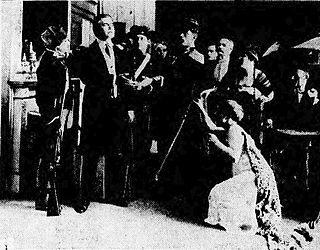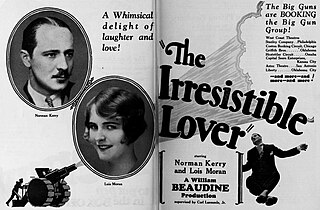Plot
This article needs a plot summary.(January 2024) |
| The Social Highwayman | |
|---|---|
| Directed by | William Beaudine |
| Written by | Philip Klein Edward T. Lowe, Jr. Daryl Zanuck |
| Starring | John Patrick |
| Cinematography | John J. Mescall |
Production company | |
| Distributed by | Warner Bros. |
Release date |
|
Running time | 70 minutes |
| Country | United States |
| Language | Silent English intertitles) |
The Social Highwayman is a 1926 American silent comedy film directed by William Beaudine. [1]
This article needs a plot summary.(January 2024) |

A highwayman was a robber who stole from travellers. This type of thief usually travelled and robbed by horse as compared to a footpad who travelled and robbed on foot; mounted highwaymen were widely considered to be socially superior to footpads. Such criminals operated until the mid- or late 19th century. Highwaywomen, such as Katherine Ferrers, were said to also exist, often dressing as men, especially in fiction.
The following lists events that happened during 1900 in New Zealand.

Russell McCaskill Simpson was an American character actor.
Events from the year 1670 in England.

George C. Pearce was an American stage and film actor, primarily of the silent era. He appeared in more than 130 films between 1914 and 1939. He was born in New York, New York, and died in Los Angeles, California. He was also known as George C. Pierce.

The Man from Home is a 1914 American drama film based on a play written by Booth Tarkington and Harry Leon Wilson. It was directed by Cecil B. DeMille. In 1922, the story was remade in the UK by George Fitzmaurice as The Man From Home, and released by Famous Players–Lasky. The stage play was a big hit for actor William Hodge in the role of Pike in the 1908 Broadway season.
The Board of Control of Toronto, Ontario, Canada, was a part of its municipal government until it was abolished in 1969. It served as the executive committee of the Toronto City Council. When it was initially created in 1896 by mandate of the provincial government, it consisted of three Controllers appointed from and by the aldermen, and presided over by the Mayor of Toronto. Beginning in 1904, the Board of Control was directly elected by the city's electorate and consisted of four Controllers, presided over by the Mayor. Each voter could vote for up to four candidates, and the four with the most votes were elected. By tradition the controller who received the most votes would get the powerful budget chief position.
Municipal elections were held in Toronto, Ontario, Canada, on January 1, 1935. James Simpson won a surprise victory in the mayoral campaign to become the first socialist candidate elected to the office.
Municipal elections were held in Toronto, Ontario, Canada, on January 1, 1931. William James Stewart was elected mayor after winning a close contest again former mayor Sam McBride.
Municipal elections were held in Toronto, Ontario, Canada, on January 1, 1930. In a close mayoral election Bert Wemp ousted two term incumbent Sam McBride. The main issue of the election was a proposed downtown beautification scheme that would have rebuilt roads in the core. The proposal was rejected in a referendum after voters in the suburbs voted against it. McBride was the plan's leading proponent, and its rejection hurt his reelection bid.
Municipal elections were held in Toronto, Ontario, Canada, on January 1, 1927. Thomas Foster was running for his third consecutive term as mayor and won a narrow victory over Sam McBride. There were two referendums as part of the vote. Toronto voters voted in favour of adopting daylight saving time for the city. They also voted in favour of spending money to create an ornate gate at the entrance to the Exhibition Place, which became the Princes' Gates.

Circus Days is a 1923 American silent comedy film starring child actor Jackie Coogan, directed by Eddie Cline, produced by Sol Lesser and Jackie Coogan's own production company, and distributed through Associated First National Pictures. It is based on the 1877 novel Toby Tyler; or, Ten Weeks with a Circus by James Otis.

The Irresistible Lover is a 1927 American silent comedy film directed by William Beaudine.
The 1950 King's Birthday Honours in New Zealand, celebrating the official birthday of King George VI, were appointments made by the King on the advice of the New Zealand government to various orders and honours to reward and highlight good works by New Zealanders. They were announced on 8 June 1950.

The Mayor of Filbert is a 1919 silent American drama film, directed by Christy Cabanne. It stars Jack Richardson, Belle Bennett, and J. Barney Sherry, and was released on May 25, 1919.
The Little School Ma'am is a 1916 American drama silent black and white film directed by C.M. Franklin and S.A. Franklin and written by Bernard McConville and Frank E. Woods. It stars Dorothy Gish.
Diamonds and Pearls is a 1917 American silent drama film directed by George Archainbaud and starring Kitty Gordon, Milton Sills, and George MacQuarrie.
A Jewel in Pawn is a 1917 American silent drama film directed by Jack Conway and starring Ella Hall, Maie Hall and Antrim Short.

Hold Your Breath is a 1924 American silent comedy film directed by Scott Sidney and starring Dorothy Devore, Walter Hiers, and Tully Marshall.